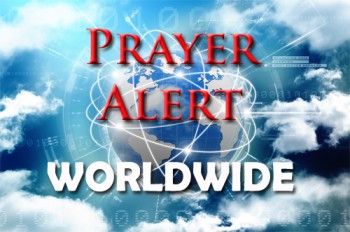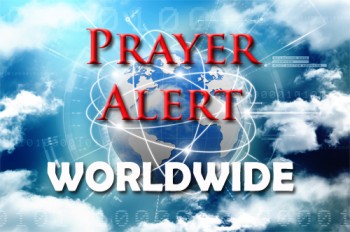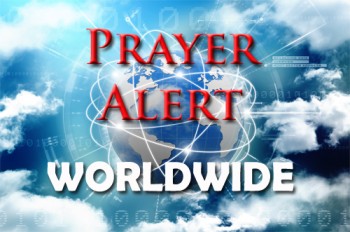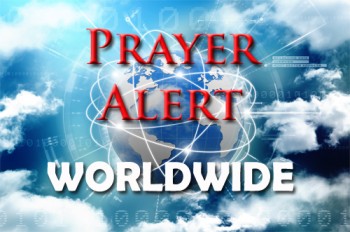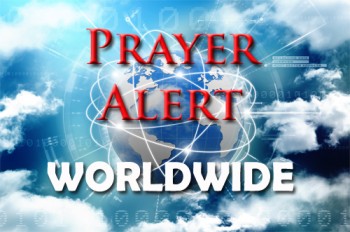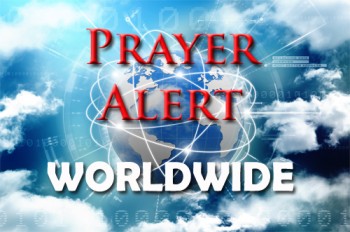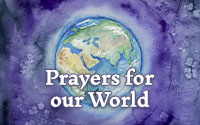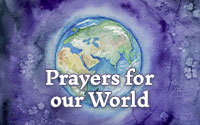Global: GO 2020 outreach
Christians will soon celebrate Christmas, BUT hundreds of millions of people have not yet heard of Christ. The great revivals and mission advances throughout church history followed the pattern of prayer preceding evangelism. Now, tens of thousands of churches with hundreds of mission organisations and prayer movements are joining forces for an epic prayer and mission initiative, unlike anything the world has known, called GO 2020. The goal is to reach one billion unreached people with Christ’s Good News. By May 2020, GO 2020 aims to have mobilised 100 million Christians to pray that unreached people groups, at home and abroad, will come to know the Lord, as mission agencies preach and teach. No one organisation can accomplish such a feat, but many can flow together like tributaries into one unstoppable river. To get involved, go to
Global: small island states and COP25
The Alliance of Small Island States (AOSIS) is an intergovernmental organisation of low-lying coastal and small island countries, many of which are put at risk by climate change. As COP 25 enters its second week, AOSIS warns, ‘We are mired in a planetary emergency of existential proportion. We have breached 60% of the 15 planetary tipping-points. The impacts are real and current for people living on small islands. The entire atoll of Tuvalu is at risk of flooding from sea-level rise by 2050. Even greater segments of other small island states are at risk much earlier than previously projected. Our schools, ports, hospitals, centuries-old monuments, sacred sites, and other critical infrastructure are at risk of inundation and destruction.’
Samoa: measles crisis
An exceptional measles epidemic in Samoa is attributed to a decision in 2018 to suspend a vaccination programme after two infants died following vaccination. UNICEF has now sent Samoa 110,500 vaccines, and the government has issued extreme measures to secure ‘public safety’ as the crisis worsens. No vehicle is permitted on the road unless it belongs to an exempt service from the public sector or is being used to seek medical assistance from a medical facility. All inter-island travel between Upolu and Savaii is prohibited, except to get medical assistance. Everyone must stay at home to await the vaccination units being mobilised for the MMR vaccination plan. Public sector services exempt from closure include hospitals, morgues, fire and emergency services, police, search and rescue, and security. But people continue to avoid vaccinations, even as the country is shut down under strict emergency laws, in part due to high-profile foreign interference.
Iran: 200+ killed, hundreds arrested
Iran's president Hassan Rouhani has called for the release of unarmed and innocent people arrested during the two weeks of protests in over 100 cities and towns after a 300% fuel price increase. The protests have now turned political as young and working-class protesters demand that religious leaders step down. Iran's leaders, blaming 'thugs' linked to the USA, Israel, and Saudi Arabia, have urged the country's judiciary to mete out harsh sentences to those involved in the demonstrations. Amnesty International reported at least 208 deaths on 2 December. Demonstrations and deaths have continued since then. Amnesty says that families of victims were threatened and warned not to speak to the media or hold funeral services. It added that the death toll is evidence that Iran's security forces went on a horrific killing spree, and urged the international community to help ensure accountability. See
Georgia: anti-corruption activism
When the ruling party, Georgian Dream, backtracked on a promise to transition to a fully proportional parliamentary system before the 2020 elections, thousands of citizens protested, demanding a progressive electoral reform. But such protesters face smear campaigns and accusations of bias - typical of the intimidation tactics used in such situations. This also happened recently in Brazil. Those who denounce corruption and human rights abuses are often the target of disinformation campaigns, with their reports and findings dismissed as ‘fake news’. Anti-corruption activism relies strongly on trust in independent media. The use of social media and the impact of fake news is a real threat for the work of organisations like Transparency International (TI). But fake news is not always easy to detect and spreads rapidly. What can be done? In Georgia, for example, coordinated accusations against TI through anonymous Facebook posts were recently detected, labelled and debunked by another civil society group.
South Africa: Eritrean family denied asylum
In July Filmon, an Eritrean victim of anti-Christian persecution, applied for political asylum via Port Elizabeth (PE). The Department of Home Affairs told him to return after a month. Despite a court order for the department to reopen its Cape Town office, people like Filmon have to make repeated trips to PE. When he finally had a hearing on 9 October, the official concluded he was a genuine victim of religious persecution - but in November his application was refused, and despite being assisted by an experienced lawyer he got a permit for only one month. His wife Sharon, a medical doctor, who fled from their Marxist-governed country ahead of her husband, was also refused asylum. Filmon has been advised to pay a bribe, as the only way to be successful, but as a matter of principle he does not wish to do this. He now has to go to PE for the fifth time, unless God intervenes.
‘Calling the whole Body of Christ to prayer and action for a lost world ‘
Christians around the world soon will celebrate once again the awesome light of Christ that has penetrated and continues to shine in the darkness of human history. At the same time, hundreds of millions of people still have yet to see that light and receive the abundant and eternal life it makes possible. They are without hope and without God, living lives of desperation and meaninglessness.
After being arrested by His light and filled with His Spirit, the early church turned the world upside down. Following Jesus’ command, as a first step they stayed in Jerusalem and “joined constantly together in prayer”.
That culture of united prayer brought the empowering of the Holy Spirit and ignited remarkable spiritual breakthroughs as the Gospel began to spread throughout the then known world. This same pattern of prayer preceding evangelism has been a consistent pattern in all the great revivals and mission advances from then on through church history.
Now, tens of thousands of churches with hundreds of mission organizations and prayer movements are joining forces for an epic prayer and mission initiative unlike anything the world has known. It is called Go 2020. The goal is to reach one billion who are still unreached by Christ’s Good News. Together, by May 2020, we aim to mobilize 100 million Christians to pray for those in their communities that do not know the Lord as well as those across the seas that are part of unreached people groups.
No one organization or movement can accomplish such a staggering feat, but if we flow together like tributaries in one unstoppable river, this can be achieved! Getting God’s heart of love for the lost through prayer will lead to our sharing Jesus with them in the power and sensitivity of the Holy Spirit just as the early church experienced.
Would you and your church or ministry organization consider joining with millions of other Christ followers in such an awesome undertaking for His glory and so that everyone may encounter His great light?
Together, as we pray, mobilize, and trust the One who has all power, we can see the following happen by the end of May next year:
One billion people being reached with the Gospel and millions upon millions getting saved all over the world through May 2020.
Unreached people groups hearing the Gospel for the first time and planting new churches among them.
100 million Christians inspired and empowered by the Holy Spirit to pray and share the Gospel with as many as possible in their own communities and to the ends of the earth.
50 million new believers integrated into existing and new churches.
Personal Prayer: Lord here I am, use me! I will pray for and share the Gospel with others who need to hear it. https://www.go2020.world/get-involved

GO2020 video: https://vimeo.com/342384375
This brochure can also be used to give others the vision of Go 2020 (some translations are also available).
Further information and helpful resources can be found at www.go2020.world/prayer. Please have a look at these resources and share them with others in your unique network of relationships.
Imagine how God could use you, your friends, and colleagues to ignite a movement for Jesus in your city and beyond!
All through 2020, a series of 40-day prayer guides will help us pray daily for those still unreached and for the harvest to be brought in. Here is the link to that guide which we hope you will share with those in your network or organization.
Please let us know if you are willing to help with this mobilization process.
The fulfillment of Christ’s Great Commission is closer than we realize if we can join our prayers and efforts together to make Him known through Go 2020.
Click on this link to get helpful resources and information updates.
Yours in Christ,
Jason Hubbard - Executive Coordinator
John D Robb – Chairma
International Prayer Council and International Prayer Connect
Open Doors latest report brings much sobering reading, but also a few positive glimmers.
In Brief:
North Korea (1) tops the World Watch List for the 18th year in a row. Despite its ranking in the top slot it did free three Korean-American Christians from a North Korean prison.
Persecution of Christians is getting worse. Five years ago only one country – North Korea – was ranked in the ‘extreme’ category for its level of persecution of Christians. This year, 11 countries score enough to fit that category.
China (27) has risen 16 places in the list after new Regulations for Religious Affairs came into force in February 2018.
In Myanmar (18) tens of thousands of members of the Karen tribe – a majority-Christian ethnic tribe – have been killed and least 120,000 displaced.
India (10) has entered the top ten for the first time. The BJP-led government continues to promote an extremist militant Hindu agenda.
In Turkey (26) President Recep Tayyip Erdogan has been stirring up ultra-nationalistic sentiment for some time and this has caused added difficulties for Christians in Turkey, especially Evangelicals.
As radical Islam has been forced out of the Middle East, it has spread into sub-Saharan Africa. Almost 30 violent Islamic extremist groups are known to be active in the region.
Islamic militants also have also gained strength in failed states like Somalia (3), Libya (4) and Yemen (8), where they continue to recruit, and capture pockets of territory.
The two places where Christians suffer the most violence are Nigeria (12) and Pakistan (5).
THE WORLD WATCH LIST: THREE MAIN TRENDS
Three major trends have shaped persecution against Christians this year:
Authoritarian states are clamping down and using legal regulations to control religion.
Ultra-nationalists are depicting Christians as ‘alien’ or ‘western’ and trying to drive them out.
Radical Islam has moved from the Middle East to sub-Saharan Africa.
GOOD NEWS
It’s not all bad news! There is light in the darkness, and the courageous faith of Christians is evident, even in the harshest conditions.
Worldwide: Above all, the World Watch List shows that the church is active and alive. Persecution is rising – but that only happens where the church is actively sharing the gospel and living it out.
Read the full report and download resources from the Open Doors Website Here: https://www.opendoorsuk.org/persecution/trends/
Pray: Lets continue to be in prayer for the estimated 245 million people worldwide who are persecuted for their Christian faith.
Pray: For those who are in prison, detention or separation from their families, due to their faith.
Pray: For the estimated 11 people a day who are martyred for being a Christian – and for their families and loved ones. (Rev 2:10)
Pray: For strength and encouragement for the Church of Christ – that it will continue to grow and flourish despite the persecution.
Even though it appears that denuclearization talks with North Korea are going nowhere, Kim Jong-un still claims to have a special relationship with Donald Trump who says that there are a "lot of things going on" with North Korea. Yet, Kim calls on the U.S. to "act wisely" through the end of the year, blaming U.S. policymakers for their hostility to North Korea. And, to make matters worse, the North shot off two missiles on the last day of October.
In the meantime U.S. and U.N. sanctions continue to hurt the North, including its fishing and coal industries even as coal smuggling into China continues at full speed and the military sells coal in order to purchase uniforms.
The North continues to send workers into China by taking advantage of loop-holes in the sanctions. A recent report to the U.N. shows the ongoing impact of sanctions on the most vulnerable in North Korea, especially women and children, pointing out that nearly 4,000 civilians have perished as a result. The report was produced by Peace Now and delivered by our Ignis partner, Joy Yoon, who, along with her husband, Dr. Steve Yoon, have been treating children in North Korea over the past ten years. Here is an interview with Dr. Yoon about North Korean children.
Meanwhile, the elderly in the North are turning increasingly to begging to survive and the U.N. Food and Agriculture Organization is predicting that the food situation will worsen. As is widely known, the North has been manufacturing and selling drugs to generate funds. The consumption of "ice" in North Korea has become a massive problem as a defector recently shared.
On the technology front, North Korean smart phones are having an increasing impact, changing society and helping merchants to cut down on their costs. The manufacture of smart phones and other high tech devices depends on rare earths which are largely controlled by China. They are strengthening their position by preparing to tap North Korea's extensive reserves in exchange for providing solar power technology. The North is also reforming its education system to put science and technology at its center.
At the same time, construction on tourist attractions forge ahead with completion of the new Wonsan beach resort expected by the spring of next year. Kim Jong-un, in a recent inspection of a new spa being built, expressed his "great satisfaction" with its "socialist architecture" even as he belittled the Diamond Mountain resort built by South Korea, calling for the old buildings to be demolished to make way for new ones. Moon Jae-in of South Korea has agreed to talks about the future of the resort.
Remembering Our Brothers in Prison
We continue to pray for six South Koreans held in the North as well as Daily NK journalist, Choi Song Min (alias). Here's information on the pastors and others who have been detained and released. Please remember them in your prayers.
Ben Torrey - Director
The Fourth River Project, Inc.
Lithuanian Foreign Minister Linas Linkevicius says Russia represents the biggest obstacle to the peace process in Ukraine, as it misleadingly represents itself as a “neutral party” in the conflict. “Perhaps the greatest obstacle in this [Ukrainian peace] process is that Russia is positioning itself as a neutral party while it is an active participant of the conflict, although officially they are not being treated as such,” Linkevicius said on November 5 in an interview in Prague with Current Time TV, the Russian-language network run by RFE/RL in cooperation with VOA.
Linkevicius said Moscow tells separatists in Ukraine that "you need to reach agreement, and we will help, while exactly the opposite is happening on the ground.” Ukrainian armed forces have been fighting Russia-backed separatists in eastern Ukraine in a conflict that has killed more than 13,000 people since April 2014.
Moscow has repeatedly denied that it has provided weapons, training, and personnel to support the separatists. However, independent observers, journalists, and official monitors, have gathered a substantial body of evidence to the contrary.
NATO and European Union member Lithuania, which has an ethnic Ukrainian population of some 44,000 people, has expressed strong support for Ukraine in its battle against Russia and has sent military equipment to back Kyiv’s efforts in the war.
Four-party talks -- with Ukraine, Russia, France, and Germany, and known as the Normandy format -- have sought to end the conflict in eastern Ukraine.
"These Normandy [format] talks and a search for a compromise are on everyone's lips. I understand that it is very difficult to do all that, but I felt current [Ukrainian] President [Volodymyr Zelenskiy's] sincere intention to resolve this issue. It is hard to say, though, how successful he will be,” Linkevicius said.
Washington Ally
Ukrainian Foreign Minister Vadym Prystayko on November 1 said the timing of a four-way summit aimed at resolving the conflict depends upon Russia. Prystayko's statement came after he voiced hope on October 29 that Zelenskiy would meet his Russian counterpart, Vladimir Putin, soon for peace talks under the Normandy format.
Putin on October 30 said he was ready to have a meeting with the leaders of Ukraine, France, and Germany. But he added that such a meeting "needs to be well prepared and produce specific results that will help the settlement."
Lithuania remains a close ally of Washington and is temporarily hosting some 500 U.S. soldiers in the Baltic nation to help bolster NATO's eastern flank near Russia's borders. Russia has accused NATO of destabilizing Europe by moving troops closer to its borders.
Pray: for a resolution to this long-running dispute to be achieved diplomatically.
Pray: for an end to the bloodshed.
Pray: for wisdom, honesty and openness to compromise - for those involved in the summits and negotiations.
Pray: that Russia will be transparent in accounting for its involvement in the conflict.

